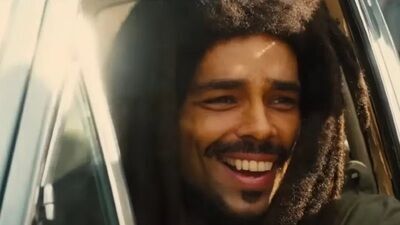Reinaldo Marcus Green, the film’s director, stands as the easy culprit. While his debut “Monsters and Men” signaled some promise, he followed that intriguing work with the saccharine true story of “Joe Bell.” You could give him a pass on that miss; after all, he came to the project late. But then he helmed “King Richard,” a sports family drama that netted Will Smith a Best Actor win even while it traded in caricatures. “One Love” sees Green once again relying on broad themes—struggling and trauma—and the same cardboard concepts of real people that doomed his previous efforts.
And yet, despite earning the lion share of the blame, Green isn’t alone in this misstep. The script, co-written by Green, along with Terence Winter, Frank E Flowers, and Zach Baylin, is a horrendous, unshaped stream of events rendered with the subtlety of bullet points.
The story directly spans 1976 through 1978: Marley, already a formidable political voice in Jamaica, is planning a unity concert to stop the violence inflicted by two warring political leaders. We’re quickly introduced to Marley’s big family—the singer had many kids through his wife and affairs, a fact the film does note—his supportive wife Rita (Lashana Lynch), his nefarious manager Don Taylor, and a few of members of his backing band, the Wailers. With his home being located in a compound, surrounded by high walls and men with machine guns, we already get the sense that Marley’s life is persistently in danger. We also learn that he loves jogging and soccer. And that’s about it.
For a time, the film tricks you into thinking it’s about the Smile Jamaica concert. Unfortunately, we zoom through the gig, as though the creatives are scared to go longer than the first ten minutes without music happening. There is no sense of Marley’s artistry, the political forces happening on the ground, or the imperative people in his life before Donald, Rita, and Marley are shot by assassins (one of them being an underused Michael Ward), causing the ailing trio to leave the country. Marley and his Wailers opt for London, where they begin recording a new record. Rita and the family go to Delaware to live with Marley’s mother. Why she lives in the United States is never really explained, and she’s barely seen on screen.

